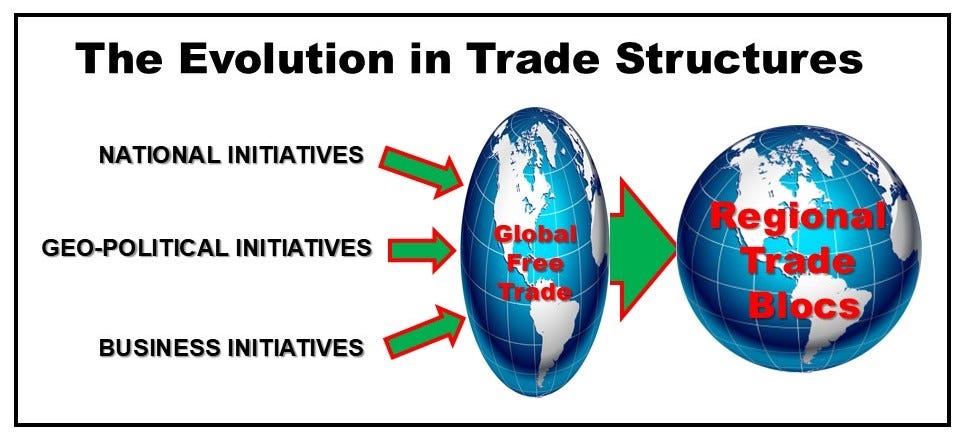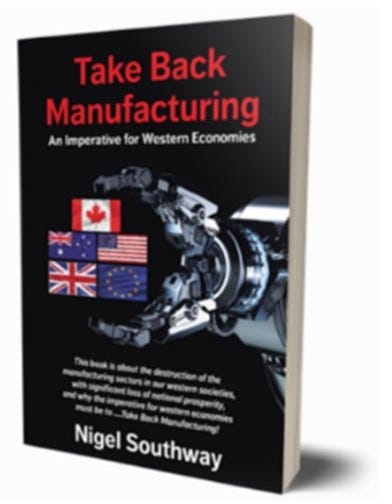Global trade …. a huge mistake.
It’s now very clear that global free trade and the new world order is very close to unsustainable.
There is an urgent need to reverse past mistakes, and disconnect our western economies from unfriendly global actors, and move us away from unsecured and uncontrolled global trade and focus on much more localized trade within the USMCA and EU trade blocs.
Many western governments are now beginning to make a reshoring / inclusive trade bloc approach a national initiative.
Not only does this reshoring of industrial capability make sense to avoid the new geopolitical risks and protect national security, but these more localized and inclusive trade blocs will also greatly improve citizen prosperity.
The business world is also reacting to the above initiatives and realizing that long global supply chains for many reasons are wasteful and unsustainable, and that being closer to the consumer is a better business model. This is why 85% of large corporations are undertaking a reshoring strategy inline with future recapitalization and investment strategies, with reshoring activity increasing by at least 50% year over year.
The failed promise of global free trade
In 1995, the World Trade Organization (WTO) became the global supervisor of world trade liberalization.
The leading Politicos in power at the time declared and promised that adopting global free trade would bring all nations closer together, reduce wars and conflict and would improve the spread of democracy.
The economists of the day were positive that “all boats would rise together” economically.
But now thirty years later none of these promises have been kept.
Today…. Nations are far from closer together, we have even more wars and conflict, democracy as a political ideology has declined, with the ascension of new major powers such as China, Russia and others adopting a non-democratic political model that is increasing geopolitical tensions.
The notion of “all boats will rise together” is a sick joke for most citizens in the western world that have experienced significant prosperity loss over the same time period.
Global Free trade has extended our supply chains and added waste to our businesses while reducing the value-added content of our western economies. Also, the associated global free movement of capital, and the financialization of our economies, has upset the delicate balance between capital and labor, which has all contributed to the significant reduction in our citizen prosperity.
In retrospect we appear to have placed the drive for uncontrolled global free trade ahead of common sense and sound economic principals.
In future we must stop listening to economists married to the failed notion of free market comparative advantage ideology.
We must stop pandering to trans-national corporations and ensure that in the future they are better controlled within our economies so that they participate fully in the costs of doing business with our consumers.
We must avoid being manipulated by the self-serving global elites who will attempt through lobbying and financial leverage to maintain the global trade environment for their own advantage.
We must come to understand that international trade is not a god given right. Such trade must only be undertaken when it benefits our citizens, and not to serve some geo-political feel-good ideology at the expense of national prosperity.
The future approach and its benefits
What follows is a punch list of the economic advantages of reshoring our industrial capability and benefiting from the significant reduction in “global waste” by moving toward a localized trade bloc approach.
Avoid Wealth transfer.
The reliance on multilateral and uncontrolled global free trade deals has created wealth transfer from the west to the rest that has created a death spiral for western citizen prosperity. To put this into perspective, Global trade has increased 8 times since 1980, but global wealth has only increased 3 times and has flatlined or worse in western nations. So, its fair to say that global trade has been very poor at wealth creation, but very good at wealth transfer.
We need to learn how to avoid these so-called multilateral free-trade agreements that are never followed by the emerging nations at great expense to the mature nations. This will include reaching the realization that global free trade and trade outside the USMCA is to be avoided based on past economic performance.
Reduce non-value adding imports and exports.
The globalization of trade has created excessive imports in most western nations that cannot be balanced with exports even when they are government subsidized. The massive trade imbalance has created the need to sell off national capital assets or support the imbalance with trans-national loans or currency manipulation.
This trade imbalance problem cannot be solved with even more unilateral trade deals, this has been the foolish approach by many past western governments, and it just does not work, and just digs the same hole deeper.
The real solution is to minimize imports by reshoring our industries and services. This will also reduce the struggle to balance imports with subsidized non-value-adding exports. We must ensure that any future exports are equitable and add far more value to the national economy.
The reshored capacity will create significantly more value adding economic activity and will better employ our citizens and generate an improved level of prosperity.
Reduce supply chain waste.
As already mentioned, global supply chains are long and add significant waste in terms of additional transactions, delays, inventory, material obsolescence and energy usage as well as 3rd world pollution.
Also, as interest rates increase back to more normal levels maintaining these long global supply chains will place additional financial burden on businesses due to the excessive cash trapped in these long supply chains. When trade is conducted inside the local trade bloc this will avoid these wasteful long supply chains that have in fact assisted in driving the need for those ultra low interest rates.
Also, many imports from offshore providers are only possible when supported by the export of raw material from other global sources. These multi-path supply chains significantly add to the overall supply chain waste, and many can be eliminated if the western nations who already have the raw materials produce their own final products. In fact, studies show that these products can be reshored and produced with almost the same or even lower costs to their consumers if coupled with the latest automation and digital transformation technologies.
Reduce global energy waste & pollution.
Global supply chains and the third world providers use far more energy and pollute far more than localized western supply chains. The sea container ships, the associated support equipment, and all the trans-national cargo aircraft have a huge carbon footprint, and collectively pollute more than 6 times all the gas-powered vehicles on the planet.
Recover economic value.
Its clear that a significant loss of value-adding direct manufacturing jobs has happened in the western economies due to globalized trade. But a bigger issue is the complete gutting of the capability to develop and provide the manufacturing technology to make our own products. This total loss of product capability in many sectors definitely qualifies as a massive national security issue. It significantly affects our food, cloths, transportation, energy, medical, and defence capability.
Also, many service jobs as well as the capability to support these functions has been offshored, and these are also strong candidates for reshoring.
The future task will be to set policies to recover economic value and get these products, services, and the related jobs back home!
Revitalize local investment.
Due to the decline in many industries and the loss of industrial and general business growth opportunities we have seen significant capital flight to other parts of the globe. But as we rebuild our industrial capability, we will significantly attract capital investment back to our nations.
Also, the significant past rent seeking of capital into real estate can be reduced and redeployed toward much more productive investment opportunities that will far better add value to the local economy.
The way forward…
Although some new policies are emerging that will move us in the correct direction, it will take ongoing trust and maturity and a coordinated team effort between all the participants of these localized trade blocs.
The new policies must form a rigid, localized trade bloc with our local national trade partners to avoid the current elevated level of imports outside of that trade bloc. This must force reshoring and make the need for imports and some exports unnecessary, so we can better balance local trade.
This must also include policies to ensure exports add far more value to our trade bloc economies by a review of the level of value-added activities and ensure that this is maximized.
We need economists to review and update the measurement of national productivity and prosperity so that such performance measurements better relate to the true impact on the lives of our citizens.
An ongoing review must be undertaken with input from business leaders and industrialists to determine which commodities and related supply chains must be better managed with government controls to relocate them back into the trade bloc.
Next, a national plan to provide resources and capacity to support such reshoring must be undertaken.
The focus must be on synergistic alignment of trade across the trade bloc so that local strengths are better harnessed such as natural resources, skills, location, and growth capabilities.
Trade bloc border controls must be revisited to ensure the seamless movement of goods and services across the trade bloc borders while ensuring unplanned and undesirable movement of goods and people are better controlled to the benefit of the citizen population.
The journey to reverse the wasteful and dangerous global trade ideology and reinstall our overall economic capability within localized trade blocs will be worth it, and its now clear it’s the only option to restore western prosperity.
The Book…. Take Back Manufacturing.
This book is about how in less than one lifetime we have experienced the destruction of the manufacturing sectors in our western societies. and the significant loss of national prosperity, and why the imperative for western economies must be to …. Take Back Manufacturing!
The globalized manufacturing approach with efficient supply chains supported by liberalized free trade agreements has been the business norm in the last four decades and has been the prime reason for the “hollowing out” of our Western industrial base.
But now many experts predict yet another significant change regarding global and national economic conditions that will, for many reasons, provide an opportunity for our western economies to move back to more localized trade blocs, and the reshoring of their manufacturing.
This book provides a perspective and outlook that suggests that with the correct political will and focus they could recover their manufacturing industries and improve future prosperity.
Nigel Southway is based in Toronto Canada and is an independent business consultant and the author of Take Back Manufacturing: An Imperative for Western Economies, and Cycle Time Management: The Fast Track to Time-Based Productivity Improvement, an early LEAN thinking textbook.
He consults and educates worldwide on Business Productivity Improvement, LEAN business practices, Advanced Manufacturing Engineering, Future Supply Chain Management, Industry 4.0, National Sustainability, Global technology transfer projects and joint ventures and more.
He is a past chair of the Society of Manufacturing Engineers and the leading advocate and spokesperson for the Take Back Manufacturing Forum, and the North American Reshoring initiative in Canada.





